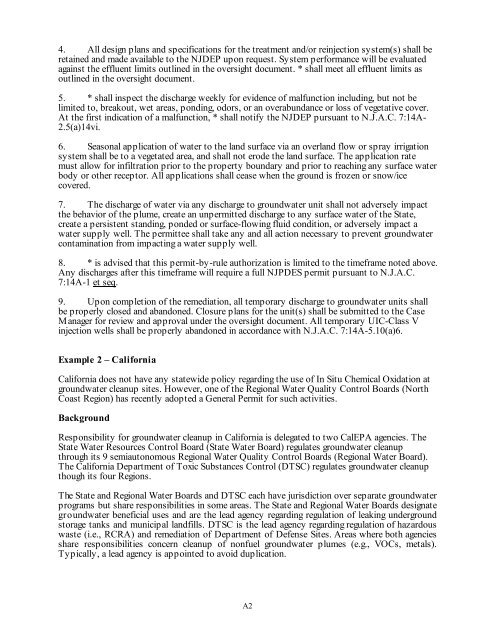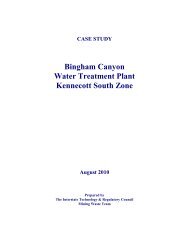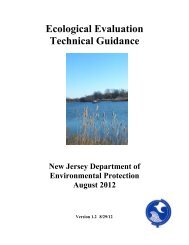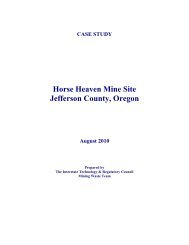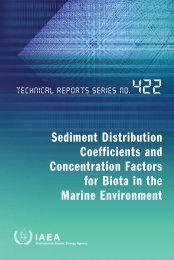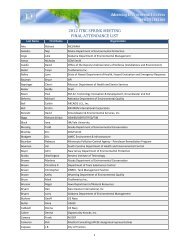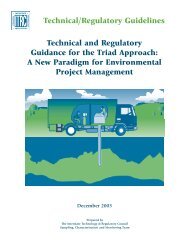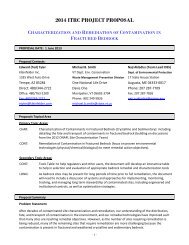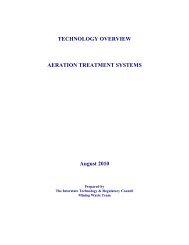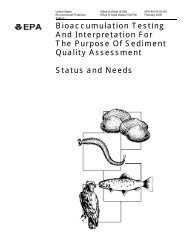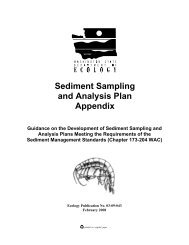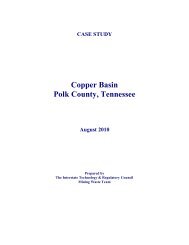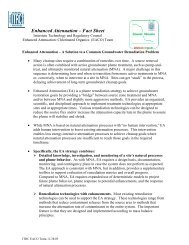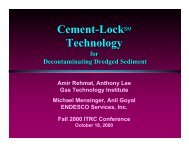Technical and Regulatory Guidance for In Situ Chemical ... - ITRC
Technical and Regulatory Guidance for In Situ Chemical ... - ITRC
Technical and Regulatory Guidance for In Situ Chemical ... - ITRC
You also want an ePaper? Increase the reach of your titles
YUMPU automatically turns print PDFs into web optimized ePapers that Google loves.
4. All design plans <strong>and</strong> specifications <strong>for</strong> the treatment <strong>and</strong>/or reinjection system(s) shall be<br />
retained <strong>and</strong> made available to the NJDEP upon request. System per<strong>for</strong>mance will be evaluated<br />
against the effluent limits outlined in the oversight document. * shall meet all effluent limits as<br />
outlined in the oversight document.<br />
5. * shall inspect the discharge weekly <strong>for</strong> evidence of malfunction including, but not be<br />
limited to, breakout, wet areas, ponding, odors, or an overabundance or loss of vegetative cover.<br />
At the first indication of a malfunction, * shall notify the NJDEP pursuant to N.J.A.C. 7:14A-<br />
2.5(a)14vi.<br />
6. Seasonal application of water to the l<strong>and</strong> surface via an overl<strong>and</strong> flow or spray irrigation<br />
system shall be to a vegetated area, <strong>and</strong> shall not erode the l<strong>and</strong> surface. The application rate<br />
must allow <strong>for</strong> infiltration prior to the property boundary <strong>and</strong> prior to reaching any surface water<br />
body or other receptor. All applications shall cease when the ground is frozen or snow/ice<br />
covered.<br />
7. The discharge of water via any discharge to groundwater unit shall not adversely impact<br />
the behavior of the plume, create an unpermitted discharge to any surface water of the State,<br />
create a persistent st<strong>and</strong>ing, ponded or surface-flowing fluid condition, or adversely impact a<br />
water supply well. The permittee shall take any <strong>and</strong> all action necessary to prevent groundwater<br />
contamination from impacting a water supply well.<br />
8. * is advised that this permit-by-rule authorization is limited to the timeframe noted above.<br />
Any discharges after this timeframe will require a full NJPDES permit pursuant to N.J.A.C.<br />
7:14A-1 et seq.<br />
9. Upon completion of the remediation, all temporary discharge to groundwater units shall<br />
be properly closed <strong>and</strong> ab<strong>and</strong>oned. Closure plans <strong>for</strong> the unit(s) shall be submitted to the Case<br />
Manager <strong>for</strong> review <strong>and</strong> approval under the oversight document. All temporary UIC-Class V<br />
injection wells shall be properly ab<strong>and</strong>oned in accordance with N.J.A.C. 7:14A-5.10(a)6.<br />
Example 2 – Cali<strong>for</strong>nia<br />
Cali<strong>for</strong>nia does not have any statewide policy regarding the use of <strong>In</strong> <strong>Situ</strong> <strong>Chemical</strong> Oxidation at<br />
groundwater cleanup sites. However, one of the Regional Water Quality Control Boards (North<br />
Coast Region) has recently adopted a General Permit <strong>for</strong> such activities.<br />
Background<br />
Responsibility <strong>for</strong> groundwater cleanup in Cali<strong>for</strong>nia is delegated to two CalEPA agencies. The<br />
State Water Resources Control Board (State Water Board) regulates groundwater cleanup<br />
through its 9 semiautonomous Regional Water Quality Control Boards (Regional Water Board).<br />
The Cali<strong>for</strong>nia Department of Toxic Substances Control (DTSC) regulates groundwater cleanup<br />
though its four Regions.<br />
The State <strong>and</strong> Regional Water Boards <strong>and</strong> DTSC each have jurisdiction over separate groundwater<br />
programs but share responsibilities in some areas. The State <strong>and</strong> Regional Water Boards designate<br />
groundwater beneficial uses <strong>and</strong> are the lead agency regarding regulation of leaking underground<br />
storage tanks <strong>and</strong> municipal l<strong>and</strong>fills. DTSC is the lead agency regarding regulation of hazardous<br />
waste (i.e., RCRA) <strong>and</strong> remediation of Department of Defense Sites. Areas where both agencies<br />
share responsibilities concern cleanup of nonfuel groundwater plumes (e.g., VOCs, metals).<br />
Typically, a lead agency is appointed to avoid duplication.<br />
A2


